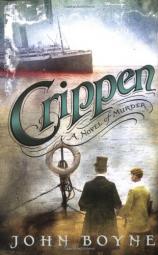Reading Group Guide
Discussion Questions
Crippen

1. In most novels, the outcome is unknown. Even though you know from the jacket description that a murder takes place, were you still able to anticipate, and enjoy, the unfolding of events? Discuss the narrative structure of the book, as well as its elements of suspense.
2. How did the early chapters about Crippen's coming-of-age affect your opinion of the would-be murderer? Did it make you sympathetic toward him? Or how, if at all, might it have compromised your objectivity toward the other characters in the book?
3. Discuss the significance of young Crippen's Scientific American magazine collection hidden beneath his mattress--and subsequently stolen by his mother. How influential was this episode to his development? Also, take a moment to talk about the Crippen family's beliefs about religion and science, and nature vs. nurture.
4. What are the themes of mortality and morality that resonate throughout Crippen's life? And in this novel?
5. Do you think there were similarities between Jezebel and Cora Crippen? Talk about the women in Crippen's life, from the outspoken Charlotte to his one true love, Ethel. What common traits did these characters possess? How were they different? And how, if at all, were they stronger than their male counterpart?
6. Crippen is set primarily in Great Britain and on the open seas. In what ways did life on the ship mirror early twentieth-century English society? Discuss the microcosm of the SS Montrose.
7. As for the characters aboard the Montrose: Was Crippen's "Mr. Robinson" a believable creation, in your opinion? What about Edmund? In one scene, while looking at himself in the mirror, Edmund acknowledges that people "often believed what was presented to them and rarely challenged it, which was how [his] deception had worked so convincingly thus far." Did the author convince you that the character of Edmund was "real"? Or did you see through the ruse right away?
8. How did you feel, after reading the Author's Note, once you realized that the events of the night on which Cora "met her bloody end" were "entirely a supposition" on John Boyne's part? Take a moment to talk about the nature of fact vs. fiction in Crippen.
9. A show of hands: Who, in the group, thinks that justice was served for Crippen? Who thinks that the case should have been considered a mistrial?
10. The circumstances of Crippen's capture relied on a "cutting-edge" technological device: the Marconi telegraph. Indeed, the case was the first in which a murder suspect was traced by means of wireless communication. Take a moment to discuss some of our more modern crime-solving techniques--as seen and popularized by such television programs as Law & Order and CSI--and ask yourselves: How far have we come? Has higher technology made the world a safer, or more dangerous, place? As a side note, talk about the ways in which crime is portrayed in the media, either as news or entertainment. Why are we so drawn to novels of murder in the first place?
Crippen
- Publication Date: March 7, 2006
- Hardcover: 352 pages
- Publisher: Thomas Dunne Books
- ISBN-10: 0312343582
- ISBN-13: 9780312343583








